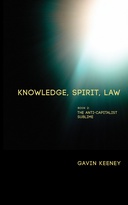Explore

Knowledge, Spirit, Law // Book 2: The Anti-capitalist Sublime
Gavin Keeney
2017
0 Ungluers have
Faved this Work
Login to Fave
Knowledge, Spirit, Law // Book 2: The Anti-capitalist Sublime takes up where Knowledge, Spirit, Law // Book 1: Radical Scholarship (2015) left off, foremost in terms of a critique of neo-liberal academia and its demotion of the book in favor of various mediatic practices that substitute, arguably, for the one form of critical inquiry that might safeguard speculative intellectual inquiry as long-form and long-term project, especially in relationship to the archive or library (otherwise known as the “public domain”).This ongoing critique of neo-liberal academia is a necessary corrective to processes underway today toward the further marginalization of radical critique, with many of the traditional forms of sustained analysis being replaced by pseudo-empirical studies that abandon themes only presentable in the Arts and Humanities through the “arcanian closure” that the book as long-form inquisition represents (whether as novel, non-fictional critique, or something in-between). As a tomb for thought, this privileging of the shadowy recesses of the book preserves, through the very apparatuses of long- and slow-form scholarship, the premises presented here as indicative of an anti-capitalist project embedded in works that might otherwise shun such a characterization.The perverse capitalist capture of knowledge through mass digitalization is — paradoxically — the negative corollary for the reduction by abstraction of everyday works to a philosophical and moral inquest against Capital. The latter actually constitutes a transversal reduction for works (across works) toward the age-old antithesis to instrumentalized socio-cultural production — Spirit. For similar reasons, the anti-capitalist sublime as presented here is primarily a product of the imaginative, magical-realist regimes of thought in service to “no capital” — to no capitalization of thought.This book seeks to re-establish paradigmatic, a-historical, and universalizing practices in humanistic scholarship associated with speculative inquiry as a form of art, utilizing in passing forms of art and exemplary paradigmatic practices that are also first-order forms of speculative inquiry — suggesting that first-order works in the Arts and Humanities are those works that may “suffer” second-order incorporations without the attendant loss of the impress of sublimity (Spirit).ABOUT THE AUTHORGavin Keeney is an editor, writer, and critic. His most recent books include Dossier Chris Marker: The Suffering Image (2012) and Not-I/Thou: The Other Subject of Art and Architecture (2014), both produced as part of PhD studies conducted in Australia and Europe from 2011 to 2014. He is also the author of Knowledge, Spirit, Law // Book 1: Radical Scholarship (2015). He is the Creative Director of Agence ‘X’, an editorial and artists’ and architects’ re-representation bureau founded in New York, New York, in October 2007.CTMPunctumBWTHE CENTER FOR TRANSFORMATIVE MEDIA, Parsons School of Design, is a transdisciplinary media research initiative bridging design and the social sciences, and dedicated to the exploration of the transformative potential of emerging technologies upon the foundational practices of everyday life across a range of settings.
This book is included in DOAB.
Why read this book? Have your say.
You must be logged in to comment.
Rights Information
Are you the author or publisher of this work? If so, you can claim it as yours by registering as an Unglue.it rights holder.Downloads
This work has been downloaded 257 times via unglue.it ebook links.
- 257 - pdf (CC BY-NC-SA) at Unglue.it.
Keywords
- Chris Marker
- cognitive capitalism
- Digital humanities
- film studies
- Film theory & criticism
- Film, TV & radio
- Films, cinema
- The arts
- thema EDItEUR::A The Arts::AT Performing arts::ATF Films, cinema::ATFA Film history, theory or criticism
- university studies
Links
DOI: 10.21983/P3.0191.1.00Editions


